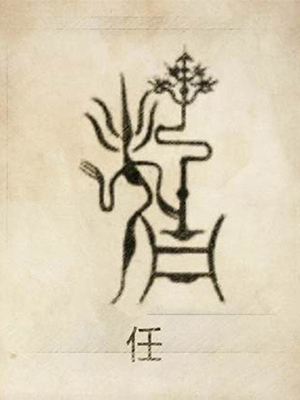The inheritance of a surname is not just the continuation of a bloodline but also the transmission of a civilization's flame. The Ren(rén) surname is like a condensed history of Chinese civilization, carrying the ancient genes of the Yellow Emperor's lineage while also recording the vibrant stories of ethnic integration.

Ⅰ、Origins of the Ren Surname
1. The Yellow Emperor's Bloodline
As one of the twelve foundational surnames granted by the Yellow Emperor, the Ren surname traces back to Yu Yang, the Yellow Emperor's youngest son. Yu Yang was granted the territory of Ren (modern-day Jining, Shandong), and his descendants adopted the name of the state as their surname, forming the main branch of the Ren family.
2. Matriarchal Legacy
The surname also originates from the ancient character "妊" (rèn), related to pregnancy and childbirth, reflecting the matriarchal society's reverence for life and fertility.
3. The Feng Clan Branch
During the Zhou Dynasty, the state of Ren was a fiefdom of the Feng clan, descendants of the legendary Fu Xi. They were responsible for rituals honoring the Ji River and astronomical observations. After the state's fall during the Warring States period, its people adopted Ren as their surname.
4. Ethnic Integration
Minority groups like the Banqiong Man in southwestern China and the Tangut people of the Western Xia Dynasty voluntarily adopted the Ren surname during their Sinicization.
During the Yuan Dynasty, Wang Xin's son changed his surname to Ren to escape persecution, and during the Qing Dynasty, the Manchu Majia clan integrated into the Han surname system.
Ⅱ、Historical Figures of the Ren Surname
1. Philosophical Pioneers
Ren Buqi: One of Confucius's seventy-two disciples, his philosophy of "respecting the past and honoring ancestors" earned him the title of Rencheng Bo during the Tang Dynasty, making him a key figure in spreading Confucian culture.
Ren Fang: A literary giant of the Southern Liang Dynasty, known for his vast library and contributions to preserving classical texts.
2. Military Leaders
Ren Xiao: A Qin Dynasty general who developed the Lingnan region, laying the foundation for the city of Guangzhou.
Ren Huan: A Ming Dynasty hero who fought against Japanese pirates, famously carving his name into his body as a pledge to fight to the death.
3. Science and Art
Ren Renfa: A Yuan Dynasty hydrology expert and painter, known for his work on the Wusong River and his allegorical painting Two Horses, which critiqued bureaucratic corruption.
Ren Yi (Ren Bonian): A late Qing Dynasty painter who blended Chinese and Western techniques, earning the title "Oriental Rembrandt."
Ⅲ、Cultural Significance
1. Family Mottos and Teachings
The "Water and Garlic Hall": During the Eastern Han Dynasty, the hermit Ren Tang used clear water and garlic to symbolize clean governance and the removal of corruption, becoming a spiritual emblem for the Ren family.
Ming Dynasty general Ren Huan's family motto: "To read and understand is filial piety; to die wrapped in a horse's hide is an honor," blending loyalty and patriotism.
2. Migration Stories
The Ren family originated in Shandong during the pre-Qin era, spread to Sichuan and Shaanxi during the Han Dynasty, migrated to Fujian during the Song Dynasty, and crossed to Taiwan during the Qing Dynasty.
Today, the Ren surname is concentrated in northern China (Henan, Hebei, Shanxi, and Shandong), accounting for 39% of the total Ren population, showcasing the influence of Central Plains culture.
3. Ethnic Integration
Examples like the Sinicization of the Xichang Ximan Yi tribe and the Manchu Renjia clan adopting the Ren surname reflect China's "unity in diversity."
Ⅳ、Social Impact
1.Ancient Governance
Ren Xiao's development of Lingnan promoted cultural exchange between the Central Plains and the Baiyue people.
Ren Renfa's water management projects safeguarded agriculture in the Jiangnan region.
2.Modern Transformation
Demographics: The Ren surname is now concentrated in Shandong, Hebei, and Henan.
Cultural Influence: Figures like Simon Yam (Ren Dahua) and Richie Jen (Ren Xianqi) have become global symbols of Chinese culture through film and music.
3.Cultural Legacy
From Ren Xinmin's contributions to China's aerospace industry to Ren Zhengfei's leadership in the 5G revolution, the Ren surname continues to drive innovation in cutting-edge technology.
Conclusion
The Ren surname is like a living history of Chinese civilization. From Confucian disciples to aerospace pioneers, from Lingnan explorers to digital age leaders, the Ren family has always embodied the "Water and Garlic Spirit," writing a chapter of "bearing heavy responsibilities and striving forward" in the long river of history.